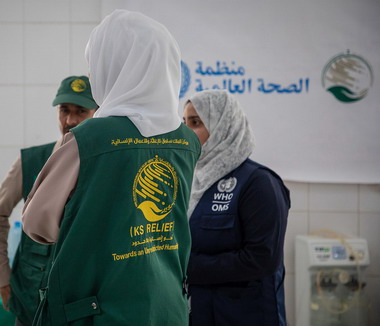
Cairo, 27 January 2021 – The World Health Organization (WHO) and the King Salman Humanitarian Aid and Relief Centre (KSrelief) have joined forces in the fight against COVID-19 pandemic in Yemen through a new project to support COVID-19 preparedness and response.
Under this new award, WHO will work with the Ministry of Public Health and Population to enable rapid detection and response to COVID-19 cases and clusters, including through an integrated, multisectoral coordination system at central and governorate levels and support to emergency operation centres (EOCs) across the country. Twenty-six main entry points to Yemen will be equipped to enable rapid COVID-19 detection.
Thanks to this partnership, critical support will continue to be provided to surveillance by supporting COVID-19 rapid response teams in high-priority districts. Furthermore, additional support will be provided to 1991 sentinel sites reporting through the Electronic Integrated Disease Early Warning System (EIDEWS). This surveillance system collects information on epidemic-prone diseases to trigger prompt public health interventions to reduce morbidity and mortality through early detection and rapid response to disease outbreaks, including COVID-19.
The joint project will also enhance the testing capacity of central public health laboratories throughout the country and support the prevention of COVID-19 transmission in health and non-health settings. Multifaceted support to health facilities will improve their capacity to receive COVD-19 patients by providing medical supplies and equipment and case management training for health workers.
"Thanks to this new contribution from KSrelief, WHO will be able to provide comprehensive support to the national COVID-19 response. It is particularity timely as WHO and health partners are preparing for a potential new spike in infections," said Dr Adham Ismail, WHO Representative in Yemen.
Funded at US$ 13 million, the project is part of a broader US$ 46 million agreement between the 2 organizations, signed in September 2020, that also included 3 other projects on nutrition, water and environmental sanitation services, and delivery of essential health services.
KSrelief has been the main funding partner of WHO Yemen in 2019–2020. Since October 2019, the partnership between the 2 organizations has helped preserve Yemen's health system, including through support to the most vulnerable. Continuous support from KSrelief has allowed WHO to facilitate the provision of life-saving medicines, including treatment for patients with chronic, life-threatening conditions, such as cancer and kidney failure. The partnership has also supported maternal and child health, including assistance to pregnant women for safe birth deliveries.
About the humanitarian crisis in Yemen
Yemen remains the world's worst humanitarian crisis and the WHO's most complex operation. Some 24.3 million people – 80% of the population – needed humanitarian assistance or protection in 2020.
The health system is on the brink of collapse. More than 17.9 million people (out of the total population of 30 million) needed health care services in 2020. At the same time, only half of the health facilities are fully or partially functioning. Those that remain open lack qualified health staff, essential medicines and medical equipment, such as masks and gloves, oxygen and other necessary supplies.
COVID-19 is underlying Yemen' public health vulnerabilities. As of 26 January 2021, Yemen's health authorities have reported 2122 confirmed cases of COVID-19, with 616 associated deaths. Health partners are concerned that underreporting continues in some areas of the country due to a lack of testing facilities, delays in seeking treatment, stigma, difficulty accessing treatment centres or the perceived risks of seeking care. Moreover, it can indicate the large asymptomatic infections that are yet to be detected in the country. Health partners on the ground continue working towards increasing surveillance; deploying dedicated COVID-19 staff within agencies; tracking the virus's impact on routine priority health programmes; refining messaging to encourage behavioural change; and boosting intensive care unit (ICU) capacity.








